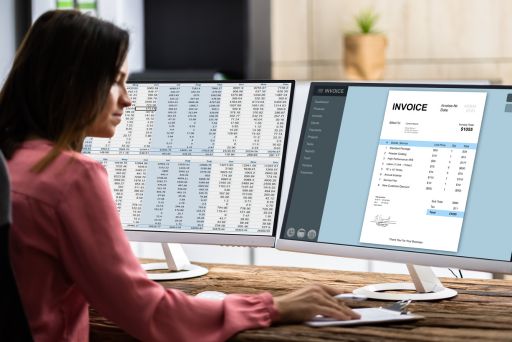Financial reports can be an incredibly helpful tool for small businesses. They can help you determine how much money you can pay yourself each month. Or they can help you decide if it’s time to expand your business. As helpful as financial reports are, they can only help you if you understand how to read them.
Luckily, Ben Sutton, Vyde’s co-founder and CPA, took the time to explain how an income statement and balance sheet work. It’s not the same as getting a 5-year accounting degree, but it’s going to give you the knowledge to make smart business decisions. Watch the video below for a great in-depth example of how financial reports work or keep reading to learn more.
Financial Reports Start with a Bank Statement
One of the things we ask our clients to send us each month is his or her business’ bank statement. This is so that we can begin to build your profit and loss, or income statement, and balance sheet. We’ll go through the bank statement to look for expenses and income. Expenses can come from a variety of places such as:
- Marketing costs
- Supplies
- Food & entertainment
- Business equipment
- Auto expenses
- Loan payments
- Owner distributions
Income is simply what money your business generates. Customer payments are the most common form of income.
Keep in mind that as we move on these expenses will be split between the profit and loss statement and balance sheet. This is where the accounting rules come in. An accountant can determine what pieces of information belong on a profit and loss statement and what belongs on a balance sheet.
What Does My Profit & Loss Statement Tell Me?
A profit and loss statement (P&L) shows the revenues, costs, and expenses for a certain time period. We like to provide our clients with a monthly or quarterly P&L statement.
The P&L is only going to show the exact income and expenses that your business had that month. Accounting rules tell us which expenses belong on the P&L and what belongs on the balance sheet.
First, you will count any income your business had. Customer payments, as we said before, count as income. One confusing point would be any loans that you have taken out during the month. It may seem like income because money is coming into your account, but it isn’t. A loan is a liability and doesn’t belong on a P&L
Before we move on to regular expenses, we’ll want to look for the cost of goods sold. Cost of goods sold is what you spend on items that are required to produce your business’ services or products. This isn’t a required section on a P&L, but it’s useful for management to see what they’re spending directly on their services.
Next, are the monthly business expenses. Expenses are any other purchases that you make for your business. These include food, entertainment costs, auto expenses, and marketing costs. Some of the other expenses we listed in the first section aren’t part of the P&L. For example, business equipment and owner’s distributions aren’t part of the P&L. They are part of the balance sheet.
Once you have determined the income, the cost of goods sold, and the expenses, you total that to determine if you have a net loss or a net gain for the month. The P&L isn’t going to tell you how much money you have left in the bank. It’s simply telling you if you spent more than you brought in that month.
What Can I Learn From a Balance Sheet?
A balance sheet gives a company a quick glimpse at its assets, liabilities, and equity. The balance sheet will be broken down into those three categories: assets, liabilities, and equity.
The assets section starts with how much cash your business has on hand. Then you list your physical assets. If you bought equipment for your business during the month, like a computer or other purchases generally over $2,500, they go in the fixed assets category. To determine your total assets, you add your cash with your fixed assets.
Next, we’re going to go through our liabilities. Liabilities refer to money that we owe and include business loans, credit cards, auto loans, and more. After we’ve determined your business’ liabilities, we can move onto equity.
Equity is usually the most complicated part of the balance sheet. In the equity section, you’ll enter your owner’s distribution, or what you paid yourself that month. You’ll also see your retained earnings. The retained earnings are calculated by either adding the month’s net income or subtracting the month’s net losses from the last month’s total retained earnings.
Finally, you’ll add your liabilities and equity together. If you’ve done everything correctly, it should add to the same amount as your assets. That’s why it’s called a balance sheet. Because your assets should always equal your liability and equity.
Why Do I Need to Understand My Financial Reports?
Before we address the conclusions you can draw from your financial reports, we want you to understand how the P&L differs from the balance sheets. The P&L shows a period of time. Whereas, the balance sheet shows a point in time. So, the P&L can show you what you made, or lost, in your business in one month, and the balance sheet shows you overall where your business is at the end of the month.
Lesson 1: Don’t Manage Your Business Off of the Cash Balance. Manage it Off of the P&L.
Without looking at both the P&L and the balance sheet, you can’t make smart business decisions. If you just look at the balance sheet, you may see that your business still has money, so you may try to pay yourself more, or make a big purchase. However, if you see that your P&L shows a net loss for the month, you might hold off on those decisions. The two go hand in hand when it comes to making a decision. You have to look at both to get an idea of where your business is truly at.
Lesson 2: Don’t Estimate Your Tax Liability on Your Owner’s Distribution
Your financial reports are also going to give you an idea of what you owe in taxes. The biggest misconception small business owners have is that they are taxed on whatever money they pull out of the business, the owner’s distribution we’ve talked about. However, this isn’t true. The Internal Revenue Service (IRS) actually taxes you on your business’ net income. The IRS isn’t going to tax you unless you’ve made a profit on your business. In order to determine your net income, you’ll want to look at those income statements (the P&L) and determine if you had a net profit or loss. Once you know that, you can determine your tax liability.
I know the process can seem overwhelming at times, but analyzing both your P&L and balance sheet regularly can help you better manage and grow your business. If you are struggling to stay on top of your accounting and finances, reach out to our team at Vyde to see how we can help!
















 When you’re juggling the operations of a small business, each task takes its turn at being the number one priority. As you check an item off your to-do list—order supplies, take inventory, create an advertisement, etc.—you’re that much closer to small business success. Your list, however, doesn’t seem to get any shorter.
When you’re juggling the operations of a small business, each task takes its turn at being the number one priority. As you check an item off your to-do list—order supplies, take inventory, create an advertisement, etc.—you’re that much closer to small business success. Your list, however, doesn’t seem to get any shorter.

